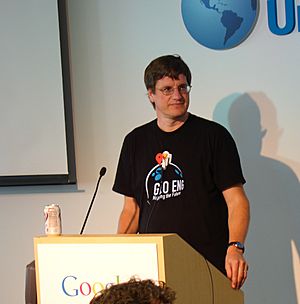Brian McClendon facts for kids
Quick facts for kids
Brian McClendon
|
|
|---|---|
 |
|
| Personal details | |
| Born | 1964 (age 61–62) |
| Political party | Democratic |
| Spouse | Beth Ellyn McClendon |
| Education | University of Kansas, Lawrence (BS) |
Brian A McClendon (born 1964) is an American expert in computer software and a creative inventor. He helped start a company called Keyhole, Inc.. This company worked with geospatial data, which means it showed information about places on Earth. Keyhole was bought by Google in 2004 and became the famous Google Earth. Brian McClendon was chosen for the National Academy of Engineering in 2015. This was because he helped create widely used and accurate maps and geographic information.
Contents
Early Life and Education
Brian McClendon grew up in Lawrence, Kansas. Interestingly, his childhood home is the very first place you see when you open Google Earth! He finished Lawrence High School in 1982. Later, he earned a degree in electrical engineering from the University of Kansas in 1986.
His Career Journey
Starting Out in Tech
Brian spent eight years at Silicon Graphics. There, he helped create advanced 3D graphics for powerful computers. After that, he worked as an engineering director at @Home Network.
Creating Keyhole
In 2001, Brian was one of the first people to invest in Keyhole, Inc.. This company made software to show geographic data in cool ways. He served on the company's board. Later, he joined Keyhole as the vice president of engineering.
Working at Google
When Google bought Keyhole in 2004, Brian became a director at Google Geo. This team focused on showing geographic data. He was later promoted to vice president, leading the entire Geo team.
Keyhole's main software, Earth Viewer, and its special language, Keyhole Markup Language (KML), became the foundation for Google Earth. While Brian was in charge, Google Geo created many popular products. These included Google Maps, Street View, Waze, and Google Earth. He also helped create the fun Google Santa Tracker.
Moving to Uber
In June 2015, Brian left Google to join Uber. At Uber, he worked on mapping technology and machine learning. Machine learning is when computers learn from data without being directly programmed.
Joining Niantic
In November 2021, Brian McClendon joined Niantic. This company is known for creating augmented reality games like Pokémon Go. At Niantic, he became a senior vice president. He focused on augmented reality, research, and mapping. Augmented reality adds digital images to the real world through your phone or other devices.
In Politics
In March 2017, Brian stepped down from his full-time job at Uber. He wanted to return to his hometown in Lawrence, Kansas. He showed interest in politics. In January 2018, he announced he would run for Kansas Secretary of State as a Democrat. He won the primary election without anyone running against him. However, he was not elected in the main election.
Giving Back and Teaching
Brian McClendon stays connected with the University of Kansas, his old university. He helps advise the School of Engineering. He also advises the Department of Electrical Engineering and Computer Science.
In 2007, he and his wife, Beth Ellyn McClendon, started a scholarship for engineering students. They also gave computer tablets to students. They even provided a special Google Liquid Galaxy display at the university. This display lets people explore maps and data in an interactive way.
In 2013, he was the Grand Marshal for the university's homecoming parade. He is now a research professor at the University of Kansas. He received an honorary doctorate from the university in 2015. His research includes machine learning, autonomous vehicles (self-driving cars), and creating maps of the whole world.
Awards and Honors
The University of Kansas gave Brian an honorary doctorate. This was for his amazing work in electrical engineering and computer science. The United Nations also honored him in 2013. He received their top environmental prize, called Champions of the Earth. This award recognized him for using technology to help protect the environment.
Brian McClendon holds 41 patents. A patent protects an invention. Thirteen of his patents are about KML. KML is a special language for showing geographic information on maps and 3D Earth browsers. KML became an open standard for GIS data in 2008. GIS data is geographic information system data, which helps us understand and visualize places.
See also
 | Selma Burke |
 | Pauline Powell Burns |
 | Frederick J. Brown |
 | Robert Blackburn |

